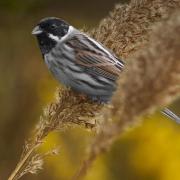Lancashire's Adele Hall rescues battery hens across the North of England. But this woman is no balaclava-clad, graffiti-spraying activist.
Adele belongs to the Battery Hen Welfare Trust (BHWT), an organisation set to give battery hens a new lease of life when they have passed their egg-laying prime.
Adele laughs off the idea of being a militant. 'We're not like that at all,' she says. 'When you first contact the farmers you can almost hear them thinking that and they're a bit wary. But what we're trying to do is work with the farmers not against them.
'At the end of the day they are running a business within the law. A lot would like to change over to free range but are worried that people won't support them by buying British. People will always look at keeping their shopping bills down, but free range eggs are only a few pence more than the battery ones.'
Adele first got involved with the BHWT, set up in Devon, when she sent an email wanting four pet chickens for her garden in Haslingden.
Now she has 12 pet chickens, including two cockerels and she is the only BHWT co-ordinator in Lancashire. That means she re-homes chickens in houses across Lancashire, North Yorkshire and Cumbria. She's even had people travel from Scotland to collect birds.
'Chickens seem to be very popular as pets,' she says.
'More and more people like the idea of having their own fresh eggs every day. I think they taste even nicer than the organic ones you can buy in the supermarkets because the hens are feeding on real grass every day.
'They make great pets. Often people say they are like dogs with feathers. They cluck round my feet when I'm hanging the washing out - it's a nice feeling. They're also very low maintenance. A big bag of feed only costs �12,but they also eat scraps and keep the slugs down.
'The average person will take four or five hens, but some will take 50. They go to families, small-time egg producers or simply people who just want a low maintenance pet.'
The work Adele does as a co-ordinator for the BHWT is a happy ending for the hens. The birds start laying at 22 weeks and will stay with the farmer for around a year.
After that their egg production goes down, so the farmers will send them to slaughter. But re-homing them as the trust does means the hens live out the rest of their lives - about another seven or eight years - in relative ease.
'I've always wanted to work with animals; she adds'. In my wedding speech four years ago I said it was my ambition to have an animal sanctuary.'
With four acres of land, two donkeys, two dogs, three cats and 12 chickens, it seems Adele is well on the way to realising this dream.
For more information about the Battery Hen Welfare Trust see the website at www.thehenshouse.co.uk


























